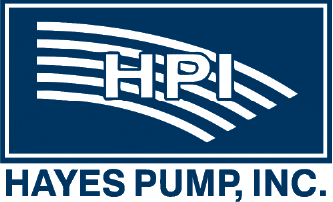Home » Blog » Unclogging the Mystery: A Deep Dive into Vortex Impeller Pumps
Unclogging the Mystery: A Deep Dive into Vortex Impeller Pumps

For industries dealing with challenging fluids, the right pump can make all the difference between smooth operations and costly downtime. At Hayes Group, we understand these challenges, which is why we're taking a closer look at a true workhorse in the pumping world: the vortex impeller pump.
What is a Vortex/Recessed Impeller?
At the core of a vortex impeller pump is its distinctive recessed impeller design. Unlike traditional impellers that make continuous contact with the fluid, the vortex impeller is positioned away from the volute passage, creating a wide, unobstructed flow path. This configuration generates a swirling vortex that moves the fluid through the pump with minimal direct contact between the impeller and the pumped material. While some contact does occur—particularly in abrasive or slurry-laden applications—the wear on the impeller is significantly reduced compared to enclosed or semi-open designs. This not only enhances durability but also improves efficiency when handling solids, including smaller particles that may result from larger solids breaking apart during transport.
The Purpose and Operation of Vortex Impeller Pumps: The Low-Contact Advantage
The primary purpose of a vortex impeller pump is to handle fluids that would quickly damage or clog conventional pumps. This design excels with:
- Aggressive Pumpage/Fluids: Because the fluid largely avoids direct contact with the impeller, these pumps are incredibly effective at handling abrasive slurries, corrosive chemicals, and fluids containing a high concentration of solids. This reduced contact significantly extends the life of the impeller and other internal components.
- Minimal Clogging: The open passage created by the recessed impeller allows large or stringy solids to pass through the pump with minimal risk of entanglement or clogging. This is a game-changer for applications where maintaining flow is critical.
It's important to note that this specialized handling comes with a trade-off. Due to the indirect method of fluid transfer, vortex impeller pumps generally have lower efficiency ratings compared to pumps with closed or semi-open impellers. However, for applications where the ability to handle difficult fluids is paramount, this lower efficiency is a small price to pay for reliable, clog-free operation and reduced maintenance. The longevity and reduced downtime often outweigh the slightly higher energy consumption in the long run.
Built to Last: Material Options for Vortex Impeller Pumps
The demanding nature of the fluids these pumps handle necessitates robust construction. At Hayes Group, we offer vortex impeller pumps in a variety of materials to suit diverse applications. Common material options for pump casings and impellers include:
- Cast Iron: Widely used for general industrial applications as it offers good strength and durability. It is a cost-effective choice.
- Ductile Iron: Compared to standard cast iron, it delivers improved strength and shock resistance.
- Stainless Steel (304, 316, Duplex): Overall, it provides superior resistance to chemicals and abrasive wear, making it an excellent choice for corrosive applications. Each grade provides a different level of corrosion resistance. Duplex stainless steel provides enhanced strength and corrosion resistance.
- CD4MCu: Often used in challenging chemical processing applications as it is a highly corrosion-resistant and abrasion-resistant alloy.
- Alloy 20: Composed of a high-nickel alloy, it provides exceptional resistance to sulfuric acid and other aggressive chemicals.
- Bronze: Particularly when paired with water, it displays good corrosion resistance.
The selection of the appropriate material for your application is crucial for ensuring the longevity and optimal performance of your vortex impeller pump. Our experts at Hayes Group can help you determine the best material for your specific fluid and operating conditions.
Versatile Designs: End Suction and Submersible Recessed Impellers
Vortex impeller pumps come in various configurations to meet different installation and application needs. Two common designs you'll find at Hayes Group include:
- End Suction Recessed Impeller Pumps: Typically, they are horizontal pumps where the fluid enters through the end of the pump casing and is discharged tangentially. Common uses include general industrial processes, dewatering, and transfer applications where the pump can be easily accessed for maintenance.
- Submersible Recessed Impeller Pumps: These pumps are designed for applications where they will be fully submerged in the fluid they pump. They are used in situations where a dry installation may not be feasible or practical. Common uses include in sumps and for wastewater treatment.
Where Vortex Impeller Pumps Shine: Common Applications
The unique capabilities of vortex impeller pumps make them indispensable in a wide range of industries. Here are just a few examples where their low-contact design proves invaluable:
- Grit/Sand Laden Fluids: Advantageous for handling fluids where abrasive solids are present such as slurry from mining, construction, or water treatment plants.
- Runoff and Wash Down Water/Cleaning: Essential in managing water containing debris, leaves, or other solids from outdoor areas or industrial cleaning processes.
- Manufacturing: Successfully handles processes involving solid-laden waste products, such as in food processing by-products or industrial effluent.
- Long Stringy Solids: Effectively pumps wastewater containing clogging materials such as rags, fibers, or other fibrous materials.
- Food Products/Shear Sensitive Materials: Ideal for processes where minimizing shear on shear-sensitive materials is critical.
The Clear Choice for Challenging Fluids
In conclusion, vortex impeller pumps, with their innovative recessed impeller design, offer a powerful solution for handling the most challenging fluids. While they may exhibit lower efficiency than some other pump types, their ability to minimize contact with aggressive pumpage, resist clogging from solids, and handle shear-sensitive materials makes them an invaluable asset in numerous industrial and municipal applications.
At Hayes Group, we are proud to offer a comprehensive range of vortex impeller pumps, backed by our expertise and commitment to providing the right pumping solution for your specific needs. Contact us today to learn more about how a vortex impeller pump can optimize your operations and reduce downtime. And be sure to check out our manufacturing partners, products, and other blogs!



